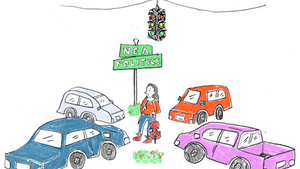Stay in the Loop
BSR publishes on a weekly schedule, with an email newsletter every Wednesday and Thursday morning. There’s no paywall, and subscribing is always free.
The Crossing at the crossroads
Art, politics, and the National Endowment for the Arts

"A bungle of roads."
That's what my then-six-year-old daughter called an intersection we had to drive through on the way to school every day: too many busy roads meeting up at one dangling traffic light. It was a particularly perilous intersection to navigate.
Right now, the intersection of arts, politics, and the National Endowment for the Arts (NEA) is a particularly perilous bungle of three two-way streets: the NEA and the arts, the arts and politics, and politics and the NEA. As president of the board of the Crossing, the Chestnut-Hill-based chamber choir, I have been watching with growing anxiety as we approach that intersection.
NEA and the arts
Without question, the NEA has had a transformative impact on the growth of many Philadelphia music groups. Without NEA support from the start, the Crossing would never have grown from a small group of friends who loved to sing, to a nationally recognized choir 10 years later (including a December 2016 Grammy nomination). The impact on the region expands beyond NEA's own dollar investment.
For smaller groups, NEA funding affixes the stamp of approval recognized by a wider universe of philanthropy. Joan Kimball, artistic codirector of Piffaro, the Renaissance Band, is concerned about the potential impact on state arts councils. Could the loss of NEA funding have a "trickle-down" effect and reduce funding from the Pennsylvania Council on the Arts? Matt Levy, a member of saxophone ensemble PRISM Quartet, worries that, without the NEA, other funders would not "be able to easily identify arts organizations whose work is superlative and vital to civic life."
Doing good in the world -- that's the connection between the arts and politics. Over the past several years, with the help of NEA funds, Orchestra 2001 brought concerts to audiences in rural Appalachia and the Navajo Nation of Arizona and New Mexico. A tour to historically black colleges in Alabama, Mississippi, and Louisiana is on the horizon. With NEA support, the Crossing will present the world premiere of "Anonymous Man" by Bang on a Can composer Michael Gordon, which gives voice to homeless men in his New York City neighborhood.
NEA and politics
Then there are the NEA and politics, a couple forced into an arranged marriage. That wrangling and wrestling has gone on for decades in Washington as part of the "culture wars," with bickering about budget priorities and acrimony over audiences' access to the arts.

For those of us who serve on the boards of arts organizations small and large, the potential loss of NEA funding means our worries will grow even worse. We already spend hours poring over cash flow statements, calculating the outcomes if our resources change. We scour donor lists to see which already generous benefactor might give even more. We juggle programming decisions so we can be nimble. The business of making art keeps us awake at night.
But I also dread the loss of the NEA on a personal level. And here is the human component: after more than 40 years of experience in the classical-music world, I've learned that it is as important for artists to have access to audiences as it is for audiences to have access to artists. For musicians, sharing their voices -- their own or those of their instruments -- is what they have trained to do. It is both their love and their livelihood. Performing for audiences is their job.
I have watched singers and instrumentalists create careers out of a patchwork of gigs with multiple performing groups. While certainly welcome, NEA grants do not play as large a role in survival for the large groups. For smaller music groups, however, NEA grants are life-giving. Without those grants, new groups will be stillborn and fledging groups will have to reduce performances or close down altogether. What happens when there are no more audiences because there are no more concerts by smaller music groups?
What happens is those performing artists are out of a job. Unemployment is unemployment. How will an administration that boasts about creating or saving jobs answer to the many who will no longer get a paycheck because NEA funding has disappeared for the very organizations that cut those paychecks?
With NEA grants now imperiled, we are drawing nearer and nearer to that terrible bungle of roads. Audiences and artists are caught in the middle of that intersection. The impending collision will have flesh-and-blood casualties.
Sign up for our newsletter
All of the week's new articles, all in one place. Sign up for the free weekly BSR newsletters, and don't miss a conversation.

 Kathryn Taylor
Kathryn Taylor
 Illustration by Hannah Kaplan
Illustration by Hannah Kaplan